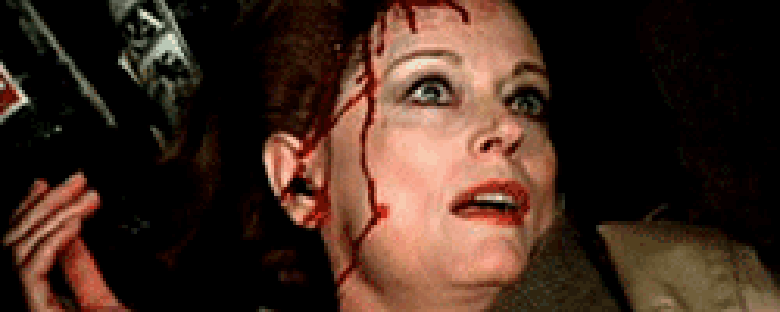Reviews
Nicolas Gessner
Canada / USA / France, 1976
Credits
Review by Tom Huddleston
Posted on 02 October 2006
Source MGM DVD
Related articles
Features: 31 Days of Horror
In Hollywood, films that genuinely resist classification tend either to become instant classics (think Dr. Strangelove, Blue Velvet), or fall through the cracks, patiently awaiting rediscovery and reappraisal (Night Of The Hunter, Out Of The Past, Harold And Maude). But this process can take time. Some of the most interesting films of the 70s and 80s — Larry Cohen’s God Told Me To for instance, or Bob Balaban’s directorial debut Parents — are still languishing in bargain bins, in the dusty horror section at your local video store, misfiled and misunderstood. And alongside them you may, if you’re lucky, find The Little Girl Who Lives Down the Lane, a discarded relic of socially conscious 70s cinema, a forgotten salvo in the generation wars, and a unique, vividly haunting experience.
It was released as a horror film, labouring under the weight of ludicrous taglines like “Ask Her No Questions And Nobody Dies!” and “What Is Her Unspeakable Secret? Everyone Who Knows Is Dead.” There are moments of suspense, shock and tension, but this is no fright flick, the filmmakers judiciously avoiding any hint of exploitation. There are political elements here, flashes of romantic comedy, rites of passage, stage drama, mystery thriller. In today’s market it would be classed as ‘indie,’ filed alongside pre-teen dramas like L.I.E. or Mean Creek. But in 1976 the film was merely out of place, unclassifiable, and quickly forgotten.
Fresh from Taxi Driver, Jodie Foster plays Rynn Jacobs, a precocious 13-year-old living alone in a rented house on the New England shore. Before her poet father died they worked out a system whereby Rynn could survive on her own, avoid school and it’s inherent ‘normalisation,’ living independent of society until she comes of age. But try as she might she is unable to avoid outside interference, from friendly local cop Miglioriti (warmly played by songwriter Mort Shuman), from the conniving landlady Mrs. Hallett and her corrupt, paedophile son Frank. Following Mrs. Hallett’s accidental death (a cellar door falls on her), Rynn stashes the body and enlists the help of crippled boy—magician Mario, who quickly becomes her best friend, her confidante and eventually her lover. But Frank is still sniffing around, and confrontation is inevitable…
The ‘unspeakable secret’ turns out to be the unwitting murder of Rynn’s mother, poisoned when she tried to take her daughter away. The film’s attitude towards death is ambivalent at best—some, like Frank, clearly deserve it; in the mother’s case it was merely a regrettable necessity. The filmmakers never attempt any criticism of the way Rynn lives her life. Her independence and bravery are enviable, her methods dubious but understandable. Like Rynn the film exists in a moral vacuum, at least where children are concerned: they know not what they do. Foster’s performance is miraculous, certain and self aware, with a depth and complexity rarely seen in child characters. Her actions are justified because she’s only trying to protect herself.
The adults in the film are treated differently. Mrs. Hallet’s interference and her patronising attitude mark her out for elimination—her death is inevitable and oddly satisfying. And Frank is nothing less than a monster, making no secret of his designs on Rynn, assaulting Mario despite his disability. Sheen plays him like the twisted mirror image of Kit in Badlands: a sunken- eyed psycho desperately trying to maintain the appearance of a normal life. The scenes between him and Foster are electric, his bullish, barely contained desire clashing with her cool confidence, her feigned indifference to his advances. We know he never stands a chance.
In a modern context, perhaps the most interesting aspect of the film is the relationship between Rynn and Mario. Despite his appearance — top hat, cape and wand — their scenes together are written almost as an adult love affair, with dinner and coy chitchat, followed by a genuinely surprising love scene. But it manages to remain convincing thanks to the performances and some perfectly judged writing. There is a real tenderness to these moments, as Rynn lets her guard slip and allows herself the luxury of trust, as Mario the cripple is finally allowed to play the protector, for the first time in his life. But underlying it all are serious questions, of morality and acceptability: can children be trusted to behave like adults, can their affections really be anything other than transitory? Rynn and Mario’s is a marriage of necessity, but can it survive?
The film has flaws. Gessner’s direction is rather drab, his soap-opera technique serving to enhance the twisted routine of Rynn’s existence but letting the darker, more fearful moments slip by. The score is, at times, simply awful, inappropriate 70s synth funk sounding garish and incongruous against the wintry New England landscape. And the conclusion is brave but ultimately unsatisfying, leaving too many open ends and unanswered questions.
But overall this is an unsung treasure, lacking the timeless power of the superficially similar Badlands or The Last Picture Show, but undoubtedly fit to breathe the same air. There are moments here quite unlike anything before or since—Mario’s spirited defence of Rynn from Frank’s grasping attentions, Rynn’s unapologetic confession that she killed her own mother, the aforementioned love scene, playful and innocent but somehow worryingly sophisticated. And at the centre of it all is Foster’s extraordinary performance, which remains perhaps her finest, despite thirty years of stiff competition.
We don’t do comments anymore, but you may contact us here or find us on Twitter or Facebook.



